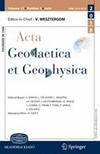Electrical resistivity and magnetic methods in mapping groundwater on the western margin of the Central Main Ethiopian Rift- A case study in the Belesa area, eastern Lemmo Woreda, Ethiopia
Abstract
Vertical electrical sounding (VES) and magnetic data were analyzed to infer the groundwater system in the Belesa area within the central Main Ethiopian Rift. The analysis is aimed at aiding in determining the groundwater potential for current and future development of groundwater resources within the Belesa area. The analysis of two-dimensional magnetic forward and one-dimensional electrical inverse models aided in locating faults, fractures, and lithological units that may contain groundwater. Lithological logs from nearby boreholes where lithological units had been determined were used to constrain the magnetic and VES models. The VES models and a magnetic derivative (tilt and horizontal) analysis mapped the existence of several possible fractures and faults that may act as either barriers or conduits for groundwater movement. The magnetic and electrical resistivity models indicated a potential aquifer associated with low electrical resistivity values occurring between 120 and 240 m in depth within the weathered and fractured ignimbrites which are bounded by faults, plus an additional potential deeper aquifer within a sandy pumice layer. Low electrical resistivity horizons provide targets for future drilling for water and a base for geophysical surveys that would further delineate the groundwater system in the Belesa area.


 求助内容:
求助内容: 应助结果提醒方式:
应助结果提醒方式:


